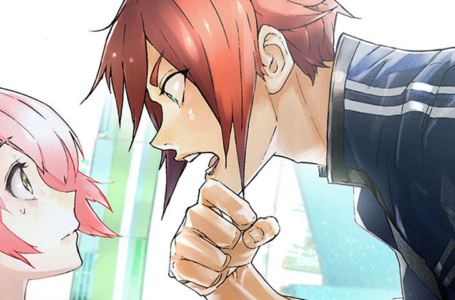The History of Lewd: Ring-Out!!
Ring-Out!! or, to give it its full title, Pro Lesring Ringout, is not a game that has gone down in history as one of the truly great visual novels. You’re lucky to find someone who remembers it at all — let alone someone who liked it.
But it was one of the first visual novels I ever played and one of relatively few Japanese erotic games that actually got officially localised back in the late ’90s — and a game which is interesting to ponder from a number of different angles. So I thought we’d do that today.
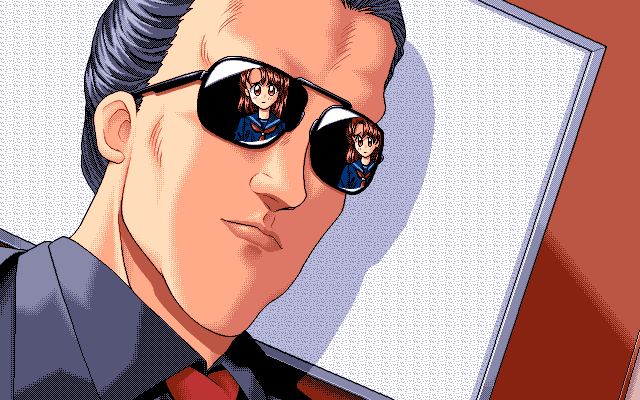
Ring-Out!! was originally released in Japan in 1995, and was the work of a company called ZyX. ZyX has actually been fairly prolific over the years, with their most well-known titles in the west likely being the yuri dungeon crawlers in the Lightning Warrior Raidy series, the two Do You Like Horny Bunnies? titles and The Sagara Family.
Most of these titles are still available today via the prolific and longstanding publisher JAST USA, but Ring-Out!! was one of a few titles localised by British outfit Otaku Publishing prior to their piracy-related demise around the turn of the century. While the game’s original 1997 release can only be tracked down via dubious means today — and good luck getting it to run properly — you can still play Ring-Out!! via the Web-based Asenheim Project website.
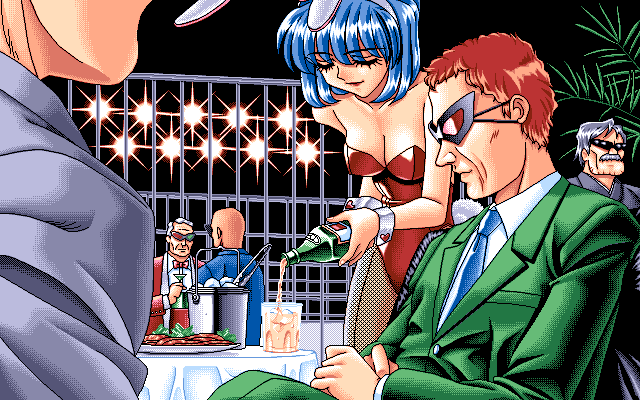
In Ring-Out!! you take on the role of high schooler Aya. Aya’s parents owe a lot of money to the yakuza, and since they’ve been unable to keep up with their repayments, Aya is taken away from them as a “down payment”. She finds herself trapped in a facility and discovers that she is to take part in an event called “Pro-Lesring” — an erotic show for wealthy businessmen and politicians in which two attractive women engage in some no-holds-barred sexual wrestling until one of them reaches orgasm, at which point the winner is allowed to do whatever they want with the loser.
If this sounds like a thoroughly ridiculous setup, you’d be absolutely right. On paper, this game as a whole is pretty much the textbook definition of a nukige — the game where the primary appeal element is the sexual content rather than the unfolding narrative. The sexual content has a flimsy justification at best, and the narrative is, in theory, just there as a means of getting from one erotic scene to another.

You may notice my hesitance in that paragraph above. Without beating around the bush, a lot of the sexual content in Ring-Out!! is exceedingly unpleasant, which begs the question who exactly this game is for, and exactly what one is supposed to get out of playing it. Because for every scene that is vaguely hot, there are at least two or three more that will have you looking in horrified fascination — or just shutting the game down completely, depending on the strength of your constitution for such things.
This is actually quite an interesting to thing to consider when looking at the history of lewd games, though — particularly those lewd games that found themselves localised for a western audience at the time. Looking back, the mid to late ’90s seems very much to have been a time of great experimentation for a lot of companies producing erotic games; a significant number of titles feature content that very much appears to be pushing boundaries and seeing exactly how far they might be able to go before either the audience turns away — or before they weren’t allowed to show anything more.

There are more extreme examples of games from this period than Ring-Out!! — but Ring-Out!! still features numerous scenes where Aya is raped, mentally and physically abused and forced into situations where she has no option but to submit to humiliation, plus a brief scat scene and an unnecessarily bloody defloration sequence. In short, it’s a seriously rocky road if you’re in this for sexual gratification, which leads one to ponder if that really was the reason it was created in the first place.
Instead, it perhaps behooves one to think of Ring-Out!! as more of a sexual horror story. It’s an uncompromising admission that society very much has a dark side — and for some people, there is no escape from that dark side once you’re drawn into it. Indeed, Ring-Out!! has three endings to its narrative according to some of the actions you take along the way — and not a single one of them can really be thought of as a “good” one. Whatever hope you might have had of Aya being able to survive her situation unscathed is dashed within the first few scenes of the narrative — and it only continues to get worse from there.
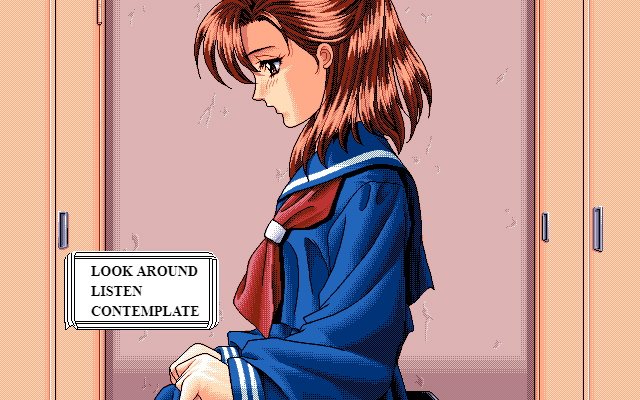
The way the game functions mechanically emphasises this, too. Rather than unfolding mostly as non-interactive text with occasional decision points, Ring-Out!! instead adopts the same adventure game-style approach many of its contemporaries made use of. In each situation Aya finds herself in, she’ll be presented with a variety of options to choose from — though in practical terms, the only way to proceed is actually to click on all of them until you’ve seen all the possible dialogue and the next event triggers.
It may not be true interactivity in one sense, but it’s quite an effective means of driving home the fact that Aya really is in an unescapable situation, and however hard she tries, however hard she wants to just run and hide, bad things are going to happen to her — and her only real options are gritting her teeth and dealing with it, or allowing it to break her completely. And some might argue that she ends up completely broken in all of the endings, anyway.
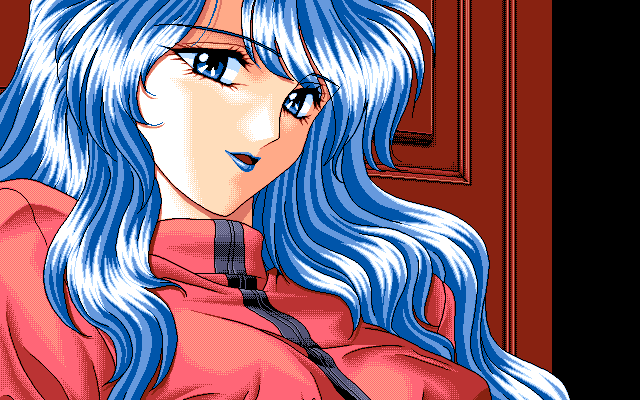
The reason this is interesting to look back on from a modern perspective is that it begs a very important question: why, exactly, did Otaku Publishing choose to localise this title over something a bit more… tame? While it was definitely relatively common to find adult games with fairly extreme content at the time, more “vanilla” affairs most certainly existed as well and would have perhaps been a better fit for an audience who, at the time, had potentially not encountered Japanese popular media all that much.
At least some of it may have had to do with that whole discovery process, particularly in Otaku Publishing’s native UK — because the British people’s first encounters with Japanese popular entertainment tended to err on the side of extremely violent, sexually explicit media including series such as Urotsukidouji and Crying Freeman. Indeed, in the October 1993 issue of PC Zone magazine, writers Laurence Scotford and Paul Lakin noted that “manga books and anime films have taken the country by storm and become bywords for a level of violence and eroticism that used to be left on the cutting room floor.” Ring-Out!! would certainly fit that description.
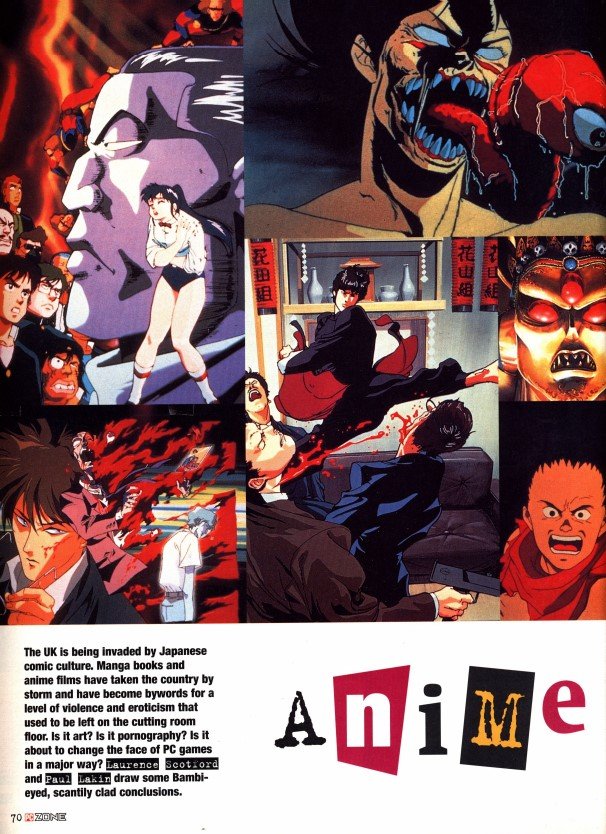
“Is it art?” they asked. “Is it pornography? Is it about to change the face of PC games in a major way?” The latter question was mostly posed due to the work of a company called Megatech, who were already localising titles such as Metal & Lace: Battle of the Robo-Babes and Cobra Mission: Panic in Cobra City at this point.
Scotford and Lakin expressed a certain amount of concern towards the amount of Japanese popular media we were getting over here that depicted “unrelenting” violence that “British readers and viewers, unaccustomed to seeing bloodshed portrayed so graphically, will find hard going”. They also noted that “the sexual aspects of manga and anime become a little more disturbing in the mixture of violence and sex in some of the more adult — as opposed to grown-up — titles… the writers and artists are certainly not averse to depicting rape and sadistic violence against women”.
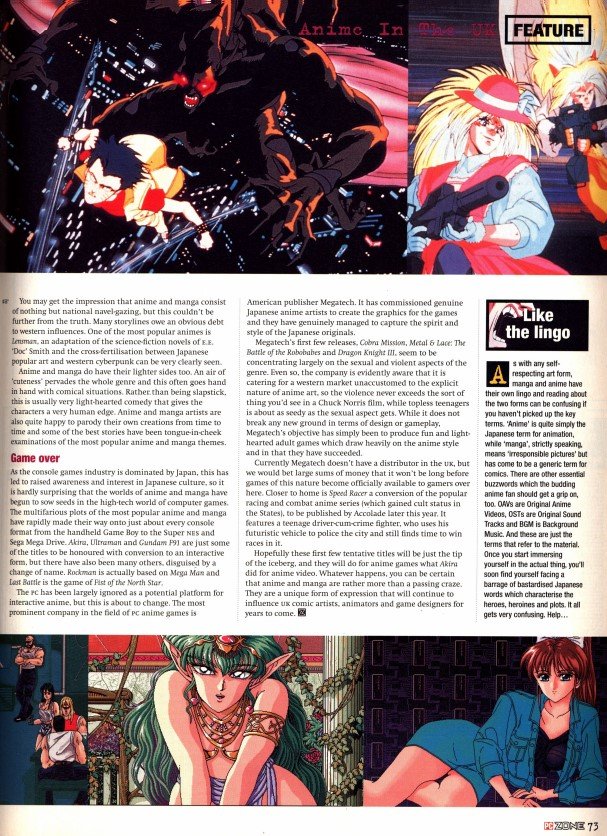
They did, however, also note that “to dismiss manga and anime for their less savoury elements is to miss out on some stunning creations” and that “many of the stories have serious things to say about the history and current status of Japan”. While I doubt anyone would attempt to argue that Ring-Out!! is a work of great literature or high art, it can, however, be looked upon as a certain type of commentary on “modern” Japanese society circa 1995.
It acknowledges that organised crime is a thing, and that people from business and politics are often complicit in the power criminal organisations continue to hold over society. It recognises that people primarily concerned with advancing their own status or seeking their own gratification tend to treat people they believe to be “beneath” them as little more than objects. It is clearly aware of the fact that young women in society can be put at a significant disadvantage by powerful men. And it admits that sometimes innocent people who don’t deserve to have their lives torn away from them end up stuck in this dark side of society, with no hope of ever escaping.
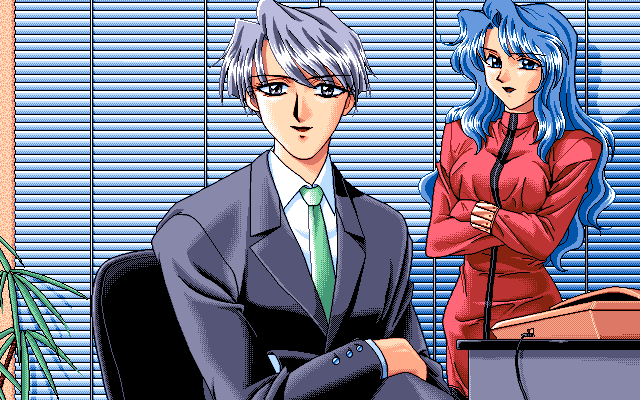
One could argue that when looked at from a certain angle, Ring-Out!! is glorifying that dark side, encouraging the audience to put themselves in the position of the wealthy businessmen and politicians who take pleasure in watching young women abusing one another. And doubtless there are people out there who have enjoyed Ring-Out!! on this level; fantasies of things that are completely unacceptable in “civilised” society are not uncommon, after all — and that’s fine, so long as they remain strictly within the realm of fantasy!
Looked at in another way, though, it can be interpreted as a work that says “look, this is how things can get at their absolute worst; do your best to make sure you play no part in making this happen for anyone around you”. And it’s arguably more effective at that; it forces you to look at everything that’s happening — including the unpleasant side of things — and ask yourself “am I really okay with this?” It’s a game that makes you ask “is this actually arousing?”
One of the reasons I’m still thinking about Ring-Out!! more than twenty years after I stumbled across it for the first time is that I still don’t have a good answer to those questions Lakin and Scotford posed in that PC Zone article. Is it art? Is it pornography? In this particular instance, it’s honestly a little hard to say.
Join The Discussion
Rice Digital Discord
Rice Digital Twitter
Rice Digital Facebook
Or write us a letter for the Rice Digital Friday Letters Page by clicking here!
Disclosure: Some links in this article may be affiliate links, which means we may earn a small commission if you make a purchase after clicking on them. This is at no additional cost to you and helps support Rice Digital!
- Letter from the Editor: passing the torch - June 30, 2023
- Super Woden GP 2 is looking promising - June 30, 2023
- Inti Creates is making a 32 bit-style Love Live action platformer - June 26, 2023





